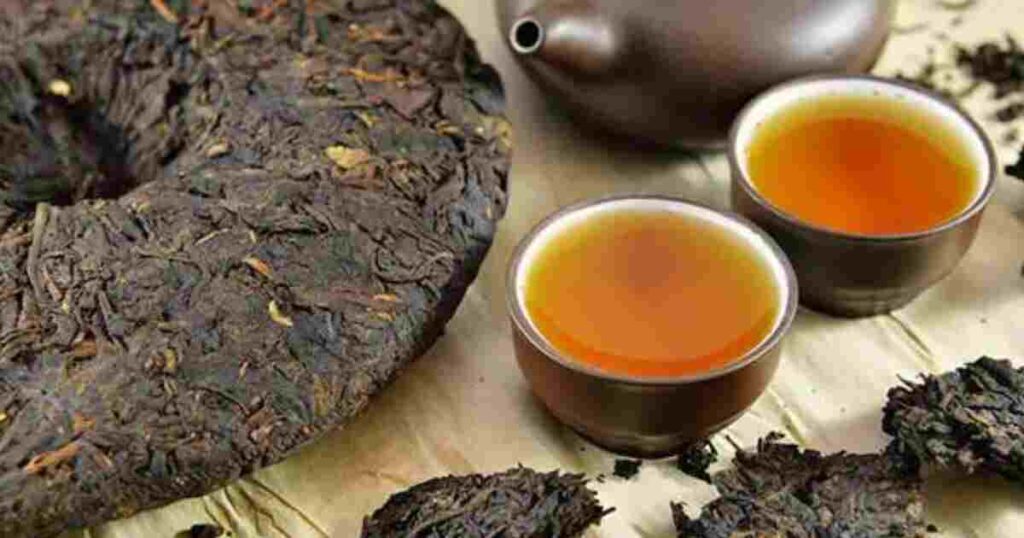Pu erh tea, a traditional Chinese fermented tea, has gained popularity for its earthy flavor and claimed health benefits like aiding digestion and reducing cholesterol.
However, while many appreciate its smooth taste and centuries-old heritage, it’s worth taking a moment to consider the pu erh tea dangers associated with regular or excessive consumption of pu erh tea.
According to a research study by X. Yang, C. Xiong, and B. Yang, the following are the potential dangers of Pu-erh tea:
1. Caffeine Concerns
One of the most common issues with pu erh tea is its caffeine content. Depending on how it’s brewed, a single cup can contain anywhere from 30 to 100 mg of caffeine. For most people, that’s fine in moderation. But if you’re drinking several cups a day, it can quickly add up.
High caffeine intake can cause:
- Trouble sleeping
- Increased heart rate
- Nervousness or jitteriness
- Upset stomach
People sensitive to caffeine or with heart conditions should be especially cautious. According to a Food Research International, drinking more than 3–4 cups a day may lead to side effects like insomnia and digestive discomfort.
Click here to learn more about Pu-erh, the fermented Chinese tea.
2. Mycotoxins in Aged Tea
Because pu erh tea is fermented and aged, it can sometimes contain mycotoxins—natural toxins produced by certain molds.
These issues can arise if the tea is stored improperly or made with subpar materials. Aflatoxin B1, a type of mycotoxin, is a known carcinogen and has been found in some poorly processed teas.
A study referenced on the ResearchGate page for pu’erh tea mentions the detection of aflatoxins in both raw (sheng) and ripe (shou) varieties.
However, the levels usually remain within safe limits in China, though they might exceed stricter European standards.
Researchers have also clarified that the mold often found in good-quality pu erh tea, Aspergillus luchuensis, is generally safe. Still, it’s a reminder to always buy from trusted sellers.
Click here to learn more about the caffeine content of Orange Pekoe tea.
3. Liver and Metabolism Warnings (At High Doses)
Before you panic, know that this danger applies mostly to extremely high doses. But it’s still worth noting.
A research study led by D. Wang and colleagues tested pu erh tea extract on rats. At very high doses (5,000 mg/kg per day), the animals showed signs of liver stress and disruptions in calcium metabolism over 91 days. The no-adverse-effect level was determined to be around 2,500 mg/kg.
That’s much more than any human would realistically consume, but it’s a good reason not to go overboard with tea powders or concentrated extracts.
Click here to learn more about how to make English Breakfast tea in Ukraine.
4. Digestive Upset
Ever felt queasy after a cup of pu erh tea? You’re not alone.
Drinking pu erh—especially raw pu erh—on an empty stomach can cause nausea, dizziness, or stomach discomfort. This is because of the tea’s fermentation and caffeine content, which may irritate the stomach lining.
Many tea lovers on forums like Reddit have shared their experiences with loose stools or bloating after drinking strong or overly concentrated pu erh. The fix is simple: drink it after a meal, and don’t brew it too strong.
Click here to learn how much tea was dumped during the Boston Tea Party.
5. Possible Histamine Reactions
Because pu erh is fermented, it can contain histamines, which may trigger mild allergic-like reactions in some people, especially if the tea was aged in a humid or dusty environment.
Some drinkers report symptoms like:
- Facial flushing
- Itchy skin
- Eye irritation
These reactions are rare, but they’re more likely if the tea is improperly stored or of questionable quality. Again, sticking to well-reviewed, reputable sources is key.
Click here to learn how to make English Breakfast tea in a mug from scratch.
How to Stay Safe with Pu Erh Tea
- Stick to 1–3 cups per day
- Rinse the leaves before brewing (a quick wash helps clean off dust and microbes)
- Avoid drinking it on an empty stomach
- Don’t mix medications without checking with your doctor
- Watch for unusual reactions and stop drinking if they happen
Like many things, pu erh tea is best enjoyed in moderation and with awareness.
A Word from GetMe Treated
Pu erh tea offers a unique and enjoyable drinking experience, but it’s not completely risk-free. Understanding pu erh tea dangers, like caffeine effects, mycotoxins, or digestive issues, can help you enjoy your tea safely. As with most natural products, it’s all about balance and being an informed consumer.
FAQs About Pu Erh Tea Dangers
Is pu erh tea safe to drink daily?
Yes, in moderation. 1–3 cups a day is considered safe for most people.
Can pu erh tea cause sleep problems?
It can, especially if you drink it late in the day or are sensitive to caffeine.
Is mold in pu erh tea dangerous?
Usually not, if it’s from proper fermentation. But poorly stored tea can be risky.
Can pu erh tea affect the liver?
Only in very high doses, like concentrated extracts, is normal tea drinking unlikely to cause harm.
Does pu erh tea cause stomach issues?
It can, especially if you drink it on an empty stomach or brew it too strong.
How can I avoid the dangers?
Buy from trusted brands, drink moderately, and don’t consume on an empty stomach.

